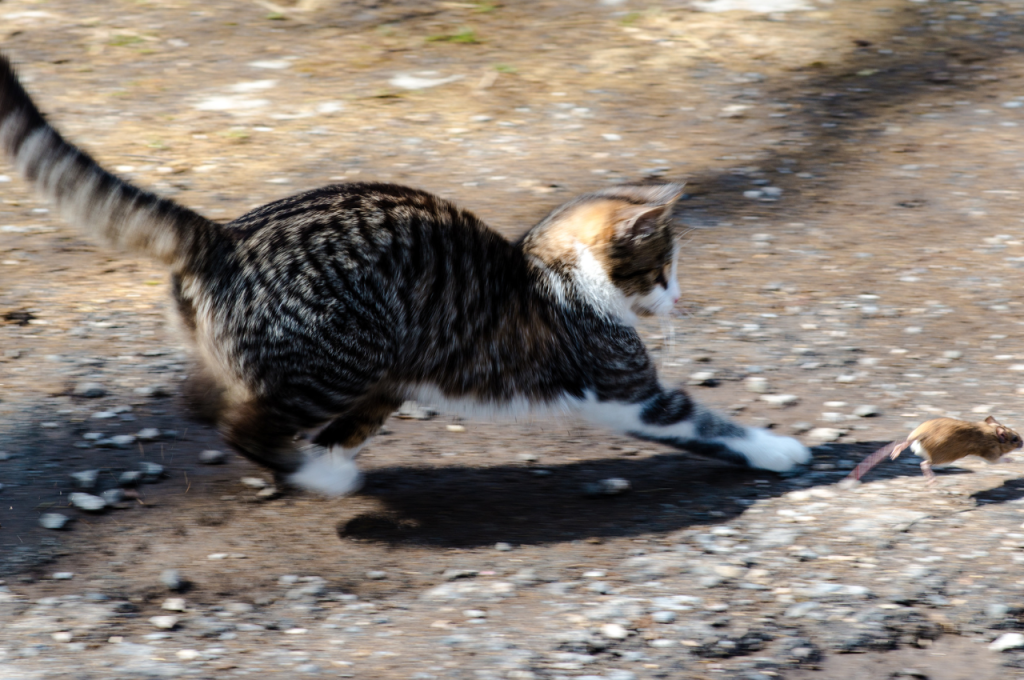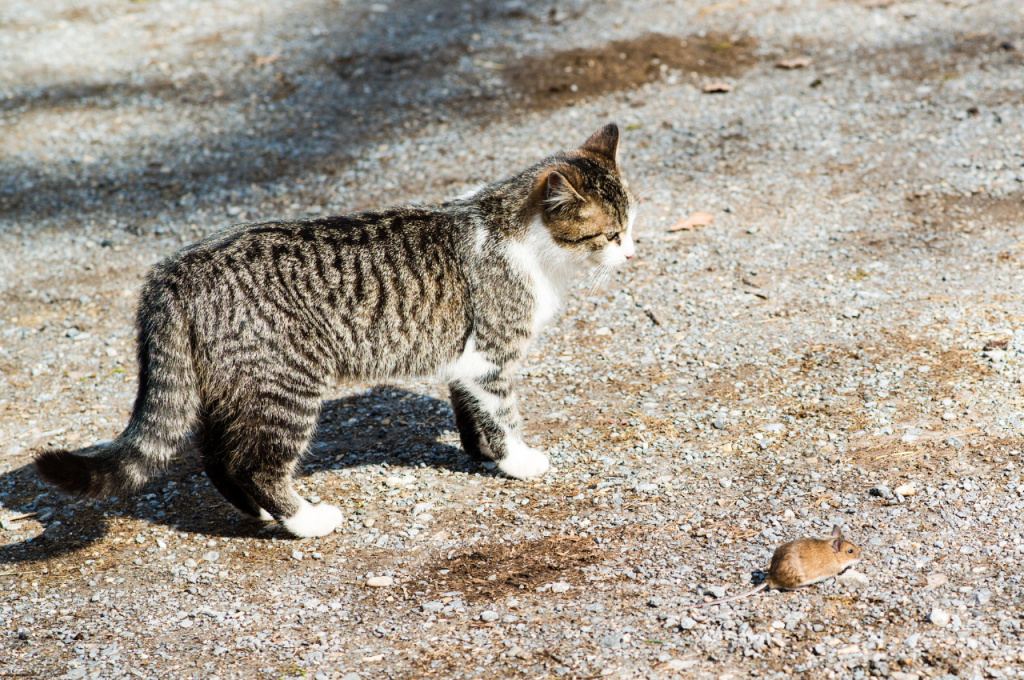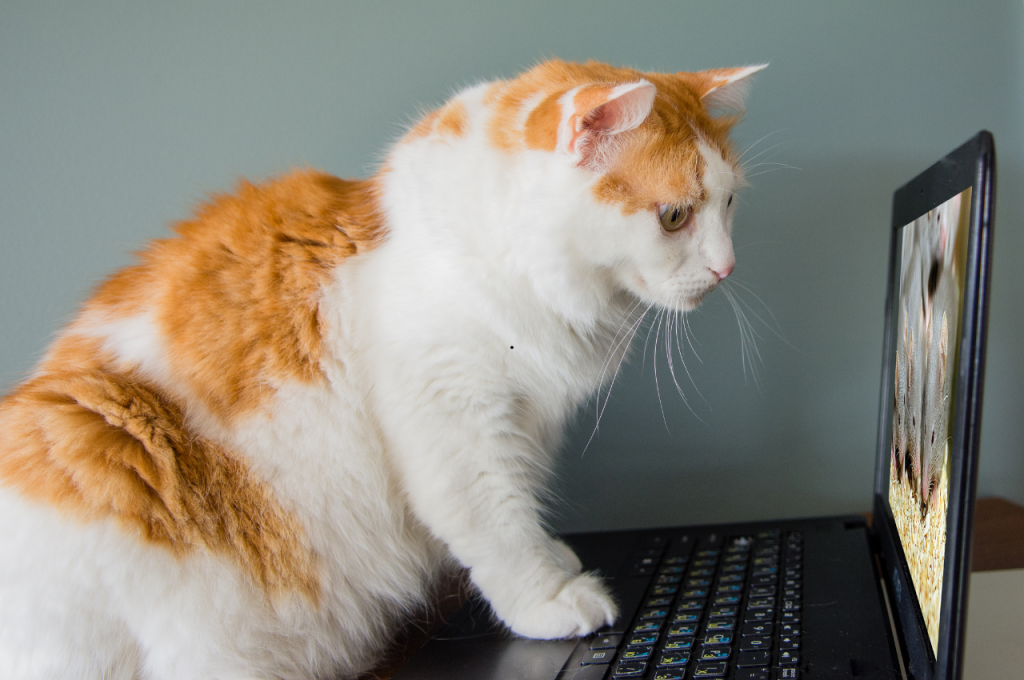If your cat eats a mouse, monitor for any signs of illness, and consult a vet if concerned. Cats hunting and eating mice is a natural behavior rooted in their instincts.
While it may seem unsettling, it’s important to understand that cats are predators by nature. In the wild, they would hunt for small animals to survive. If your cat brings a mouse into your home or eats one, it may trigger mixed emotions for you as a pet owner. Let’s explore the reasons behind this behavior and whether there are any potential risks involved in your cat consuming a mouse.
The Natural Instinct of Cats
Cats have a natural instinct to hunt and catch prey, including mice. While it may be alarming to see your cat eat a mouse, it is a normal behavior for them. However, it is important to monitor their health and ensure they are up to date on their vaccinations and deworming treatments.

Predatory Behaviors in Felines
Cats possess inherent hunting skills that are deeply ingrained in their nature. Whether they are domesticated or not, cats retain a strong instinct to hunt and capture prey. This predatory behavior stems from their ancestors who relied on hunting for survival.
Understanding Your Cat’s Hunting Instinct
Observing your cat’s hunting behavior can provide valuable insights into their natural instincts. Cats exhibit stalking, pouncing, and capturing prey as part of their hunting routine. This behavior is a manifestation of their primal instinct, not a sign of hunger. Cats are skilled predators with a keen sense of sight, hearing, and agility. They rely on these senses to track, chase, and catch prey effectively. Cats are opportunistic hunters, meaning they hunt not out of necessity but out of instinct and enjoyment. It’s essential for cat owners to understand and respect their pet’s hunting instinct.
Providing cats with interactive toys and activities that simulate hunting can help satisfy their natural urge to hunt. Remember, a cat catching a mouse is a display of their innate hunting prowess, not a cause for concern.
Risks of Eating Mice
When it comes to your cat’s hunting habits, it’s natural to wonder about the risks of eating mice. While many cats enjoy the thrill of the chase and the taste of fresh prey, there are potential dangers associated with consuming mice. Understanding these risks can help you make informed decisions about your cat’s outdoor activities and overall health.
Parasites and Diseases
Cats that eat mice are at risk of ingesting parasites such as roundworms, tapeworms, and other gastrointestinal parasites. These parasites can lead to digestive issues, weight loss, and other health problems in cats. In addition, mice may carry diseases such as leptospirosis, tularemia, and hantavirus, which can be transmitted to cats through consumption of infected prey.
Chemical Poisoning
Another concern with cats eating mice is the potential for chemical poisoning. Mice may have been exposed to rodenticides or other toxic substances, which can be transferred to the cat when they consume the prey. Ingestion of these chemicals can lead to poisoning and adverse health effects in cats.
Notable Symptoms to Watch for
When your cat consumes a mouse, it’s important to pay attention to any changes in appetite or behavior and signs of illness or distress that may indicate a potential health issue.
Changes in Appetite or Behavior
Reduced food intake or refusal to eat altogether could be a sign of digestive issues after consuming a mouse. Increased lethargy or hiding behavior may also indicate discomfort.
Signs of Illness or Distress
- Vomiting or diarrhea
- Bloody stool
- Excessive drooling
Abnormal breathing patterns or seizures could also be indicative of poisoning from the mouse. If you notice any of these symptoms, contact your veterinarian immediately.
Preventive Measures for Cat Owners
As a cat owner, it’s important to take preventive measures to ensure your cat’s health. If your cat eats a mouse, it’s best to monitor them for any potential health issues, such as vomiting or diarrhea. It’s also recommended to keep your cat’s vaccinations up to date and to regularly deworm them to prevent any diseases that could be transmitted through rodents.
Safe Alternatives to Live Prey
It’s natural for cats to hunt and catch small prey like mice. However, allowing your cat to eat live mice can pose health risks for both your pet and your household. Fortunately, there are safe alternatives to live prey that can satisfy your cat’s hunting instincts without the potential dangers. One option is to provide your cat with interactive toys that mimic the movements of prey. These toys can engage your cat in a play session that simulates hunting, providing mental and physical stimulation. Look for toys that have realistic movements and textures to make the experience more enjoyable for your feline friend.
Another alternative is to introduce puzzle feeders or treat-dispensing toys. These toys require your cat to work for their food, stimulating their natural problem-solving skills and keeping them mentally engaged. By using these toys, you can redirect your cat’s hunting behavior towards a safer and more controlled environment.
Securing Your Home Against Rodents
Preventing your cat from eating mice also involves taking preventive measures to keep rodents out of your home. By securing your home against rodents, you can minimize the risk of your cat coming into contact with these potential sources of illness. Here are some steps you can take:
- Seal any cracks or openings in your walls, floors, and foundation that may serve as entry points for rodents.
- Ensure that your doors and windows are properly sealed, without any gaps that rodents can squeeze through.
- Keep your home clean and tidy, as clutter can attract rodents and provide them with hiding places.
- Store food in airtight containers to prevent attracting rodents to your pantry.
- Regularly empty and clean your pet’s food and water bowls to avoid attracting rodents.
- Consider using rodent traps or repellents in areas where rodents are likely to enter, such as basements or attics.
By implementing these preventive measures, you can reduce the chances of mice entering your home and consequently lower the risk of your cat encountering them. In conclusion, while it may be concerning if your cat eats a mouse, there are preventive measures you can take as a responsible cat owner. By providing safe alternatives to live prey and securing your home against rodents, you can ensure the well-being of your cat and maintain a healthy living environment.
Immediate Actions After Your Cat Eats a Mouse
If your cat eats a mouse, it’s natural to be concerned. However, immediate action is necessary to ensure your cat’s health. Monitor for any signs of illness, contact your veterinarian, and consider preventive measures such as deworming.

If you’re a cat owner, you know how curious and playful your feline friend can be. Sometimes, that curiosity leads them to hunt and eat rodents like mice. While it’s normal for cats to hunt, it’s important to know what to do if they eat a mouse. Here are some immediate actions you should take to keep your cat healthy and safe.
When to Contact a Vet
If your cat has eaten a mouse, it’s important to watch for any signs of illness. While cats are natural hunters, mice can carry diseases that can be harmful to your pet. Here are some symptoms to look out for:
- Vomiting or diarrhea
- Lack of appetite or refusing to eat
- Lethargy or weakness
- Dehydration
- Fever or elevated body temperature
- Difficulty breathing
If you notice any of these symptoms, it’s important to contact your vet immediately. They can examine your cat and determine if any treatment is necessary.
Home Care Tips
If your cat seems healthy after eating a mouse, there are a few things you can do at home to help them stay that way. Here are some tips:
- Keep your cat indoors. This will limit their exposure to mice and other rodents that could carry diseases.
- Ensure your cat is up-to-date on their vaccinations. This will help protect them from diseases that mice can carry.
- Monitor your cat’s behavior and health. If you notice any changes, contact your vet.
- Consider using a mouse trap or hiring a pest control professional to remove mice from your home.
In conclusion, it’s normal for cats to hunt and eat mice, but it’s important to take immediate action if your cat eats a mouse. Watch for any signs of illness and contact your vet if necessary. Follow these home care tips to help keep your cat healthy and safe.
Long-term Health Considerations
Cat eating a mouse can pose health risks due to potential parasites or diseases transmitted. Regular veterinary check-ups are essential for long-term health considerations. Monitor your cat’s behavior and consult a vet if concerned about potential health issues.
Regular Vet Check-ups
Regular vet check-ups are essential for ensuring the long-term health of your cat, especially if they have consumed a mouse. The presence of mice in your cat’s diet can expose them to various health risks, such as parasites or diseases that the mouse may carry. Therefore, it is crucial to schedule routine visits to the veterinarian to monitor your cat’s overall health and address any potential issues that may arise from consuming mice. During these check-ups, the vet can conduct physical examinations, perform necessary tests, and provide appropriate treatments to keep your cat in optimal health.
Diet and Nutrition
Proper diet and nutrition play a significant role in maintaining your cat’s long-term health, even if they occasionally eat a mouse. While cats are natural hunters and may instinctively catch mice, it is important to ensure they receive a balanced diet that meets all their nutritional needs. A well-balanced diet not only supports their overall health but also helps them develop a strong immune system to combat potential infections or diseases from consuming mice. Consult with your vet to determine the best cat food options that provide the necessary nutrients and consider incorporating high-quality commercial cat food into their diet.
Exercise and Enrichment
In addition to regular vet check-ups and a balanced diet, providing your cat with plenty of exercise and enrichment is crucial for their long-term health. Engaging in physical activity helps maintain a healthy weight and promotes overall well-being. Interactive toys, scratching posts, and playtime with their human companions can help satisfy their natural hunting instincts and prevent boredom. Keeping your cat mentally stimulated and physically active can reduce the likelihood of them seeking out mice as a source of entertainment or stimulation.
Monitoring Behaviors
While it may be challenging to completely prevent your cat from hunting mice, it is important to monitor their behaviors closely. If you notice that your cat is frequently catching and consuming mice, it may be a sign of underlying issues such as hunger, boredom, or a lack of proper nutrition. By observing their hunting habits, you can address any potential concerns early on and take appropriate measures to ensure their health and safety. Regularly assessing their behavior and adjusting their diet, exercise routine, or environmental enrichment can help minimize their inclination to hunt mice.
In conclusion, although it is natural for cats to catch and eat mice, there are long-term health considerations to keep in mind. Regular vet check-ups, a balanced diet, ample exercise, and close monitoring of their behaviors are essential for maintaining their overall health and well-being. By taking these proactive measures, you can help ensure that your cat stays healthy and happy, even if they occasionally indulge in their hunting instincts.
Understanding Your Cat’s Dietary Needs
Balanced Diet for Indoor Cats
Indoor cats require a balanced diet to ensure they receive the necessary nutrients for optimal health. A combination of high-quality commercial cat food and occasional treats can provide the essential proteins, fats, vitamins, and minerals that indoor cats need to thrive.
The Role of Hunting in Feeding
Hunting is a natural behavior for cats and stems from their ancestral instinct to seek out prey. While domesticated cats may not rely on hunting for sustenance, the act of hunting and catching prey can provide mental and physical stimulation. It allows cats to exhibit their natural behaviors, contributing to their overall well-being.
Common Myths and Misconceptions
Common myths and misconceptions about cats eating mice abound, leading to confusion and concern among pet owners. Let’s debunk some of these myths to gain a better understanding of this natural behavior.

Cats Can Digest Anything
Contrary to popular belief, cats cannot digest all parts of a mouse. While their stomach acid is powerful, some components, such as fur and bones, may not be fully broken down. This can lead to potential digestive issues, including vomiting and intestinal blockages. Therefore, it’s important to monitor your cat’s behavior after it consumes a mouse and seek veterinary care if any concerning symptoms arise.
All Cats Need to Hunt
While hunting is a natural behavior for cats, not all cats require hunting to thrive. Some indoor cats may exhibit hunting behavior as a form of play, while others may show no interest in hunting at all. Providing interactive toys and engaging activities can help satisfy their hunting instincts without the need to consume prey. Additionally, ensuring a well-balanced diet can reduce the instinctual drive to hunt for food.
Conclusion
If your cat eats a mouse, there’s no need to panic. It’s a natural instinct for cats to hunt and eat small prey. However, it’s important to monitor your cat for any signs of illness or parasites. To prevent this behavior, provide your cat with enough food and toys for mental stimulation.
